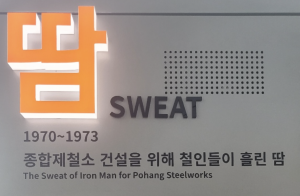Pohang: POSCO Museum
Photo essay of wall text of POSCO Museum of Pohang

Photo essay of wall text of POSCO Museum of Pohang

XXX

"But more significantly, in addition to revealing the reproduction of inequality, the fissures rendered visible by the entry of gender-based violence into humanitarian missions force an engagement with new forms of the political. Humanitarianism’s mission has expanded so that it now occupies a dominant place in the global political arena – whether humanitarians asked for this or not"
"It seems that humanitarianism, as universalism,both erases and depends on difference; on the one hand, it manages difference, declawing it so that it doesn’t tear apart the humanitarian kit, made to fit and rehabilitate everyone into a basic bare-bones humanity. That is, it assumes that difference ultimately leads back to sameness: to some nondescript, generic human survival. Yet on the other hand, humanitarianism is necessarily built on difference – the difference between two populations – those who have the power to protect, and those who need protection66 – those who suffer, and those who recognise and address suffering"
"It seems that MSF workers assumed that sexual violence would bring a particular sort of shame, greater than that accompanying other forms of violence or brutality; and therefore that it should be kept quiet, confidential, in the private realm. This particular approach stems from the historically and culturally situated belief that a woman’s chastity is her most precious possession and that sexual violence is more significant than other forms of violence – of course,the question is whether it is equally significant for female and male, straight and queer."
""USAID has spent about $1.5 billion since the earthquake,' Johnston told Goats & Soda. 'Less than a penny of every dollar goes directly to a Haitian organization.'"
This quote shows the extreme difference in total money donated compared to the money that is being used to help Haiti directly. I was mentioned that their government is hard to trust, so outside companies tend to hold the money, but that means that they can decide how they want to spend it.
"The U.N. and its agents are "absolutely immune from suit in this Court," Oetken ruled."
This quote shows the irony of the situation, by using the word "immune" it brings light to the fact that the UN's actions had major impacts on Haiti, from with the people of Haiti are very much not "immune", as cholera affects so much of the population.
I was very compelled by the entire film. It was very interesting and revealing of all aspects of the ER. Most people only get to see one perspective ever, let alone at one time, so this helps give perspective and show everyone that everyone else is working hard and trying to help.
When community factors such as transportation and insurance status were minimized as factors preventing HIV/AIDs care, the playing field was leveled within a few years. No longer were those issues much more often seen in the patients that did not survive, rather, they were seen more evenly in those that did and did not survive.
Combining clinic treatments with home-visits and prescription drug deliveries has been found to be most effective for treating all people, regardless of social factors, in places from rural Africa to Boston, MA.
Mutli-faceted approach in rural areas were most effective and able to dramatically reduce Mother-to-Infant-Transmission of HIV. This requires more resources and organization, but it takes care of the issue most efficiently in areas that are very poor and have very rudimentary infrastructure, even worse than in poor cities.
The NYS Ebola Preparedness Plan was criticized by the public and other agencies, primarily for its strict quarantine protocols, which have been called "overzealous" by some. In addition, the policy was criticized for its inconsistency with Federal and international guidelines which may have created confusion for the public.
Lakoff has a PhD in social anthropology and is an associate professor of sociology at the Univeristy of Southern California. Collier in an associate professor of international affairs at the New School in New York. Both authors have extensive backgrounds in studying people, but not disease, so their stance in this paper is not looking at the biological or emergency response aspects, but more how people plan and react to such.
Dr. Emily Goldmann, PhD, MPH, is an Assistant Research Professor of Global Public Health at New York University's College of Global Public Health. She received her Master's and Doctorate's degrees in epidemiology from the University of Michigan. She has worked as an epidemiologist at the New York City Department of Health and Mental Hygiene in the Bureau of Adult Mental Health, where she conducted surveillance of psychological distress, serious mental illness, and psychiatric hospitalization among New Yorkers and assisted in designing and implementing a study of patients for psychiatric illness following Hurricane Sandy.
Dr. Sandro Galea, MD, MPH, DrPH, is a physician and epidemiologist. He is also the Robert A. Knox Professor and Dean at the Boston University School of Public Health. He has also previously held academic and leadership positions at the University of Michigan and at the New York Academy of Medicine. He has been involved in numerous research efforts and publications. His research focuses on the social production of health in urban populations, with a focus on brain disorders, mood-anxiety disorders, and substance abuse. He also maintains a strong interest in the consequences of mass trauma and conflict worldwide, including as a result of the 9/11 attacks, Hurricane Katrina, and the Iraq and Afghanistan wars.